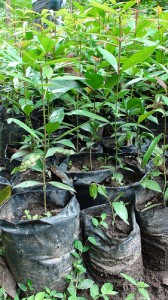 This is the first post in a new series highlighting people’s stories of Nourishing the Planet. It comes from Anthony Munene in the Embu Slopes of Mt. Kenya Forest.
This is the first post in a new series highlighting people’s stories of Nourishing the Planet. It comes from Anthony Munene in the Embu Slopes of Mt. Kenya Forest.
The poverty population, lack of education and deforestation is increasing. When I was 15 years, we used to walk for 3 minutes into thick forest but today, after 13 years, I will walk for some miles. I have taken time trying to figure out what went wrong from the beginning and have found that since Agriculture change after colonial who introduced coffee and Tea in our community as a development approach assuming that increase in income will eliminate hunger, but the export have become gendered as masculine while other feminine with women being considered weak and passive.
The burdens today have tripled. Men are the head of house hold and make most if not all agriculture decisions, and maintain majority of control over assets and resources. They mismanage cash from tea and coffee, take all the space by planting tea and coffee bush leaving no space for food production then they get lost into forest day/night cutting lumber which is in high demand on our growing cities. Women and children are left at home suffering and find their help also to the forest cutting down the young trees for fire wood and charcoal for some income to make ends meet{men clear huge trees ahead} .
This kills me and when I think of what I see I shed tears, I am now determined to work with women and youth who are now strong to get into the forest and do massive destruction and convince those who are being used as beam transporter for miles to view our precious forest in a different direction. Promoting biodiversity, intensive organic farming and permaculture ways, and the preservation of indigenous food through seed banks, help change the mentality that eating western junk food is development and civilization and eating cassava is not backward.
At the moment I am writing the budget for 200 beehives which will be started by women in the forest. I am also finding ways and organizations which the project can get grant to help bring hope to the women and youth of Mt Kenya and change to agricultural practices to restoration and sustainable ecosystem for current and future generation.”

Danielle Nierenberg, an expert on livestock and sustainability, currently serves as Project Director of State of World 2011 for the Worldwatch Institute, a Washington, DC-based environmental think tank. Her knowledge of factory farming and its global spread and sustainable agriculture has been cited widely in the New York Times Magazine, the International Herald Tribune, the Washington Post, and
other publications.
Danielle worked for two years as a Peace Corps volunteer in the Dominican Republic. She is currently traveling across Africa looking at innovations that are working to alleviate hunger and poverty and blogging everyday at Worldwatch Institute’s Nourishing the Planet. She has a regular column with the Mail & Guardian, the Kansas City Star, and the Huffington Post and her writing was been featured in newspapers across Africa including the Cape Town Argus, the Zambia Daily Mail, Coast Week (Kenya), and other African publications. She holds an M.S. in agriculture, food, and environment from Tufts University and a B.A. in environmental policy from Monmouth College.








